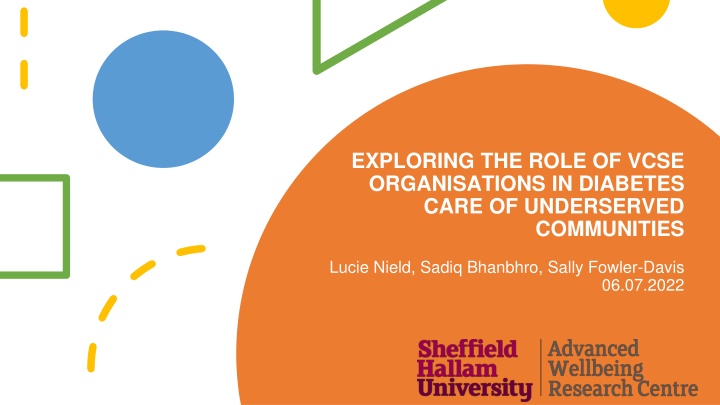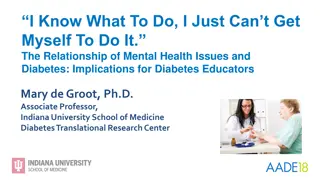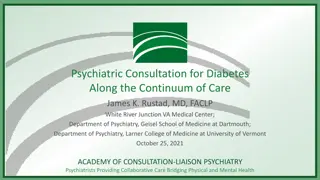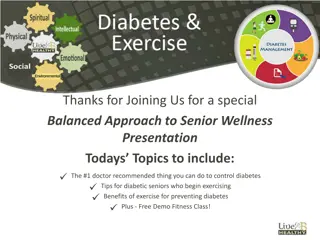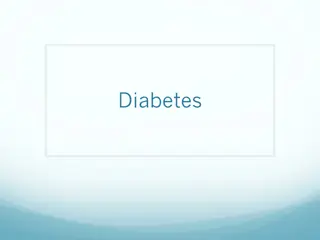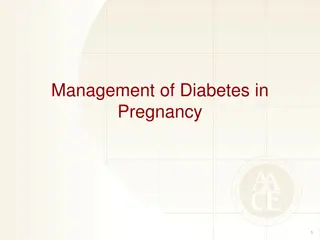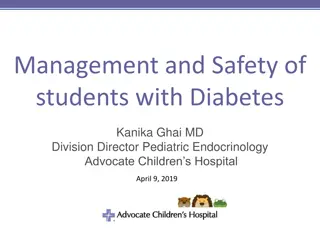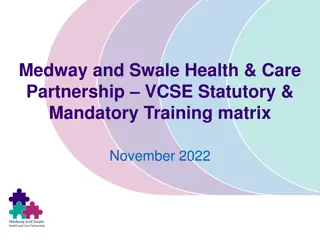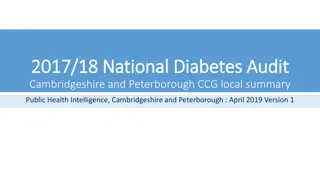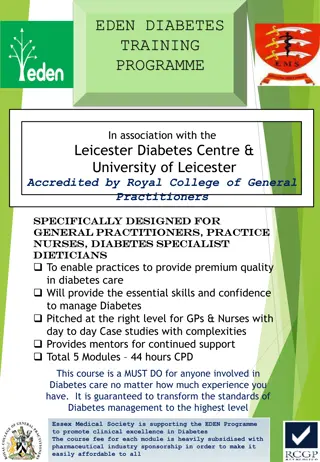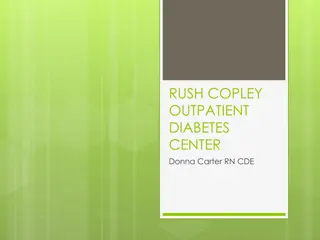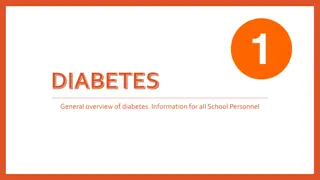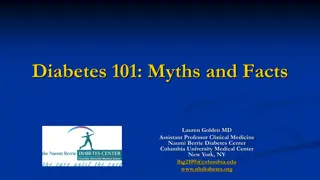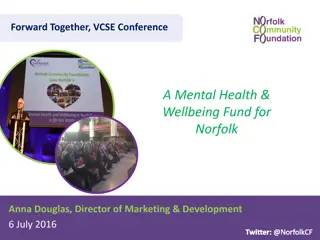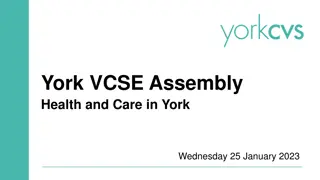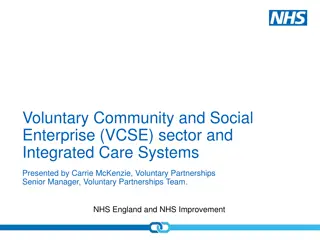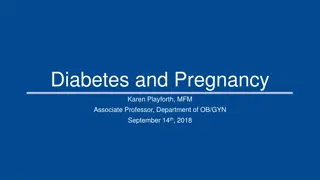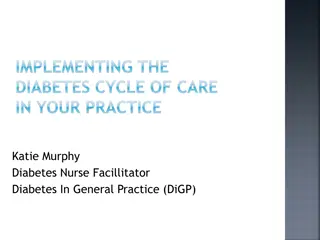Role of VCSE Organizations in Diabetes Care for Underserved Communities
This study explores the vital role of Voluntary, Community, and Social Enterprise (VCSE) organizations in supporting individuals with Type 2 diabetes mellitus (T2DM) from underserved backgrounds. It focuses on the impact and effectiveness of VCSE services in diabetes care, aiming to collect user perspectives, evaluate service offers, and co-design research studies to enhance diabetes management in Sheffield. Through methods like Appreciative Inquiry (AI) and qualitative interviews, the study seeks to generate meaningful insights and inspire positive community-wide actions for improved diabetes care.
Uploaded on Feb 17, 2025 | 0 Views
Download Presentation

Please find below an Image/Link to download the presentation.
The content on the website is provided AS IS for your information and personal use only. It may not be sold, licensed, or shared on other websites without obtaining consent from the author.If you encounter any issues during the download, it is possible that the publisher has removed the file from their server.
You are allowed to download the files provided on this website for personal or commercial use, subject to the condition that they are used lawfully. All files are the property of their respective owners.
The content on the website is provided AS IS for your information and personal use only. It may not be sold, licensed, or shared on other websites without obtaining consent from the author.
E N D
Presentation Transcript
EXPLORING THE ROLE OF VCSE ORGANISATIONS IN DIABETES CARE OF UNDERSERVED COMMUNITIES Lucie Nield, Sadiq Bhanbhro, Sally Fowler-Davis 06.07.2022
Background Covid-19 pandemic highlighted and elevated the importance of Voluntary, Community and Social Enterprise (VCSE) sector role (MacInnes et al., 2021) VCSE organisations often have a deep understanding of local community needs (UK Community Foundations, 2022) Provide support to marginalised communities who may not access traditional healthcare settings (PHE, 2021) Type 2 diabetes mellitus (T2DM) prevalence correlates with low socio-economic status (SES) and often underserved groups (Roper et al., 2001; Brown et al., 2004)
Study context Diabetes self-management is necessitated but not easy for individuals to achieve Voluntary Action Sheffield (VAS) have been working to understand the role of the VCSE sector in diabetes management Thinking about whole-systems approaches to diabetes management in Sheffield
To work with VCSE organisations to co-design a qualitative research study To collect user perspectives and stories of people with lived experience To evaluate the combined service offers across the health and care system. To evidence the impact of the VCSE services in diabetes care Aims & Objectives
Appreciative Inquiry (AI) Developed in the mid 1980s by David Cooprider and Suresh Srivastva. It is a methodology that begins a dialogue between individuals, expands to groups and builds to embrace community wide intentions and actions. Based in social constructionism that focuses on positive inquiry about accomplishments and values. It generates new meaning and inspires new possibilities by seeking to achieve significant insights Appreciative Inquiry and Public Dialogue: An Approach to Community Change | SpringerLink (2002)
Methods Stage 1- VCSE partners conducted qualitative semi-structured interviews with past/present service users living with T2DM Stage 2- SHU transcription and qualitative framework analysis by 3 researchers following the 5 stages: familiarising (reading and rereading data transcripts) identifying a thematic framework (the theory change thematic framework informed the analysis) indexing (entered short summaries into the coding frame) charting (entering themes into a matrix using columns and rows for summarised data) mapping and interpretation (comparing and contrasting data excerpts, searching for patterns, and seeking explanations for patterns in the data). Stage 3 Synthesis of findings involving drafting and sharing results with all participants, providers and participants to refine and sense-check data findings for fidelity
Six key themes were identified: 1) Information sources and communication 2) Trusted services and health professionals 3) Personal diabetes journey 4) Diet and nutrition choices 5) Active self-management 6) Additional support Findings
Theme 1: Information sources and communication Commonly participants received early advice and guidance which was generic and not tailored or culturally appropriate DESMOND courses were received variably by the participants, as was information provided by their health care professionals (HCPs) Many felt that information from professionals wasn t available when they were ready to accept it or when they needed reassurance. They told me to watch my They told me to watch my diet, watch what I eat diet, watch what I eat- - plenty greens, less carbs, plenty greens, less carbs, and to exercise and that and to exercise and that will keep my blood sugars will keep my blood sugars down (White British Male, down (White British Male, 65+ years ) 65+ years ) They readily turned to the internet and friends or family members for advice in the absence of HCPs, accessing evidence of variable quality
Theme 2: Trusted services and health professionals A good rapport and regular contact with HCPs was appreciated and useful; particularly when this information was tailored or personalised The information I was given The information I was given was appropriate for me. I was appropriate for me. I visited the nurse at the Doctors visited the nurse at the Doctors surgery every 3 months for my surgery every 3 months for my bloods, She was very good and bloods, She was very good and I developed a good relationship I developed a good relationship with her, she told me about with her, she told me about exercise classes in the area exercise classes in the area and also told me about health and also told me about health walks. (Asian Female, age 56 walks. (Asian Female, age 56- - 64 years) 64 years) Many of the interactions with HCPs were impacted by the Covid-19 pandemic leaving patients feeling alone with their diabetes management Those who engaged with VCSE organisations felt that they were provided with support and information which allowed them to better manage their diabetes
Theme 3: Personal diabetes journey Biographical disruption was commonly reported post- diagnosis which had detrimental and sometimes long- lasting effects on the individuals mental health I was sad- did nothing, got stressed, put on a lot of weight, eating a lot more than usual. (White British Female, 26-45 years) The reported impact of the diagnosis on their mental health was very significant and often prevented them from processing or using the diabetes management information. Many also report ongoing concerns about the long-term implications of living with diabetes
Theme 4: Diet and nutritional choices Those who had support from friends and/or family members reported making better food choices, whilst others were limited by household challenges such as deprivation and multiple morbidity My husband was very My husband was very helpful and supportive...he helpful and supportive...he helped me reduce some helped me reduce some weight I realised that weight I realised that when I cut down on sugary when I cut down on sugary stuff and started eating less stuff and started eating less rice and chapati my weight rice and chapati my weight dropped by itself. I also dropped by itself. I also started walking a lot and started walking a lot and me and my husband would me and my husband would go for walks after the go for walks after the evening meal (Asian evening meal (Asian Female, age 56 Female, age 56- -64 years) In addition to social support, self-motivation and elicitation of knowledge from multiple sources was effective at providing individuals with the confidence to make changes. 64 years)
Theme 5: Active self-management Participants who had engaged with the local VCSE service benefitted from local knowledge and a shared understanding of the challenges of living well with diabetes, and the practical steps they could take through discussion with others in a similar situation While some participants were self- motivated and able to make changes due to their perceived self-control , others found that there were barriers such as ill health and side-effects to medication. Many also self-medicated using alternative therapies and traditional remedies The information I got was from .a really good group. You know, it's, it helps me really, to manage the day to day... Day to day menu, day to day exercising everything. I mean, every everyone that was there was going through the same thing. I mean, the shared experience, we all shared our experience, you know, because everybody was different there. And they understood what everybody else had going on. So it helped. (Black British Caribbean Female, age 65 years+)
Theme 6: Additional Support Most participants wanted to be recognised as having both a cultural heritage and a health support need. There was recognition that some groups were missing out on the collective knowledge about health. There is a need for a lot of There is a need for a lot of improvement culturally improvement culturally because then if we because then if we introduce traditionally if introduce traditionally if there is one person get the there is one person get the information he spread it out information he spread it out to the a big job to for the to the a big job to for the people's awareness in people's awareness in mainly in Asian mainly in Asian community (Asian British community (Asian British Male, age 46 Male, age 46- -55) They wanted practical, supportive information and services delivered by professionals in ways specifically tailored to their community They felt that group and community building would be important to learn with and from one another They requested support to be offered regularly and sustainably rather than a programme of a defined duration 55)
Participants reported an inconsistent range of support post T2DM diagnosis and very limited engagement with the main educational programme offered as a standard (DESMOND) The evaluation identified the benefits of hyper-local group activities, often employing peer to peer processes to share information about living with T2DM. Advice, guidance, and long-term support were not consistently available, but deemed important. While VCSE organisations maintained relationships and were more culturally appropriate (concerning language and cultural diets), there was still a demand for more responsive and cohesive support for lifestyle and behaviour changes. Conclusion
Impact of this study 1. The theory of change associated with VCSE activity demonstrated the opportunities for systemic support for more marginal populations with T2DM and City-wide discussions are progressing about their role across primary care 2. The evaluation has enabled a large specific grant application from a collaborative group of VCSE organisations to enable a partnership approach to piloting new services to meet the more deprived population health need 3. An NIHR programme grant is being prepared in respect of the findings; to develop a health coaching intervention across primary care, based on this preliminary co-production 4. The VCSE sector has an increased role in healthcare. There is a case for capacity and capability building of the sector organisation to support the broader healthcare sector effectively.
References Brown AF, Ettner SL, Piette J, Weinberger M, Gregg E, Shapiro MF, et al. (2004) Socioeconomic position and health among persons with diabetes mellitus: a conceptual framework and review of the literature Epidemiol Rev, 26: 63-77 Finegold, Holland & Lingham (2002) Appreciative Inquiry and Public Dialogue: An Approach to Community Change Public Organization Review, 2:235 252 MacInnes J, Wilson, P, Sharp R, Gage H, Jones B, Frere-Smith K et al. (2021) Community-based volunteering in response to COVID-19: The COV-VOL Project https://arc- kss.nihr.ac.uk/news/voluntary-sector-plays-key-role-in-delivering-community-services-during-lockdown PHE (2021) https://www.gov.uk/government/publications/health-inequalities-place-based-approaches- to-reduce-inequalities/place-based-approaches-for-reducing-health-inequalities-main-report Roper NA, Bilous RW, Kelly WF, Unwin NC, Connolly VM (2001) Excess mortality in a population with diabetes and the impact of material deprivation: longitudinal, population based study BMJ, 322: 1389- 1393 UK Community Foundations (2022) https://www.ukcommunityfoundations.org/our- impact/understanding-local-need
